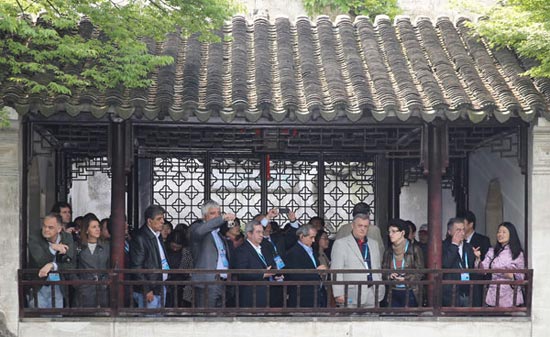
 |
| Foreign guests for the fourth China-Europe High-Level Political Party Forum visit Lingering Garden, a classical Suzhou-style garden located in Suzhou, Jiangsu province, on Monday. Xu Jingxing / China Daily |
What is required for China, the world's second-largest economy, to reach the next, more sophisticated level?
At a Monday seminar in Taicang, Jiangsu province, visiting European delegates and German entrepreneurs in China discussed megatrends in China's economy and their implications for German companies.
Rudolf Scharping, Germany's former defense minister and former chairman of Social Democratic Party, moderated Monday's discussion.
Scharping identified urbanization, sustainability in industries, higher quality of production and resource efficiency as the four major trends in China's economy. He said he wanted to hear opinions from German entrepreneurs on these trends.
"My frequent contacts with German companies in China and Chinese companies in Germany led me to believe that there is a specific need to adjust the future development to a state of harmony between economic growth, human needs and ecological conditions," Scharping said.
Industry concerns
Thilo Koeppe, managing director of Dunkermotoren (Taicang), a brushless DC electric-motor manufacturer, said he sees a huge demand in China's urbanization process as increasing mobility spurs demand for railways, metro lines and automobiles.
Wang Jiasheng, managing director of Ebner Industrial Furnaces (Taicang) Co Ltd, an Austrian manufacturer, said he sees potential in China's reduction of energy consumption and industrial facilities.
Wang said China's urbanization will lead more consumers to use high-quality metal products. Heat-treatment technology will make the steel and metal better suited for some applications, he said.
However, German entrepreneurs said China's megatrends bring challenges as well as opportunities.
For example, Wang said, rising wages for Chinese workers in the past few years have cut his company's competitiveness.
"Now we have to compete fiercely with local enterprises as well as overseas enterprises such as those in India," Wang said. For the past few years, his employees' salaries have been increasing at a pace of more than 10 percent annually.
But Wang and his company will stick with China because of the huge market. China now buys more than 50 percent of the world's metals, Wang said.
Climbing value chain
China's desire to climb up the value chain and become a source of high-end manufacturing also requires faster improvement of its labor force, German entrepreneurs said.
Christian Blatt, general manager of Krones Machinery who also serves on the board of the German Chamber of Commerce, said the GCC conducted an annual survey on Germany companies in China, asking what concerns them most. For many years, energy and supply shortages and intellectual property rights topped the list.
"However, in last year for the first time, human resources entered the top-concerns list," Blatt said.
Erik Breslein, general manager of Zollner Electronics, which produces electronic products for high-speed trains and automobiles, said a better education system is his top concern for his company's operations in China.
"For the past decade we have grown 6 to 7 percent annually. But as China is growing more and more in the direction of high tech, you really need high-quality people to handle the high-tech machineries," Breslein said, adding that his company is establishing a training program for workers.
















 Teenager saves mom with his bare hands
Teenager saves mom with his bare hands


![]()
